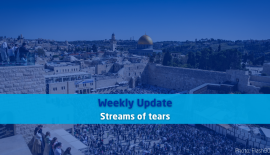Weekly Update: Solving the Israel-Palestine conflict?
For decades, the secular West has been trying to find ‘solutions’ to the ‘Israel-Palestine’ conflict. We think we can decide how peace will be achieved. The best solution we have come up with is to divide the land. The Oslo Accords were the summit of this thinking. Russia, US and EU pressured Israel to sign the agreements with the terrorist leader Yasser Arafat. The territories were divided. Jews and Palestinians were separated.
But we now realise the peace envisioned by Oslo was an illusion. This is because we in the West do not understand the culture of the Middle East. The historian Bernard Lewis in his 1998 book ‘The Multiple Identities of the Middle East’ argued that “the modern, secularized Westerner has great difficulty in understanding a culture in which not nationality, not citizenship, not descent, but religion, or more precisely membership of a religious community, is the ultimate determinant of identity.” For Lewis, even in countries where there is no formal separation of Church and State, “the modern Western observer no longer attaches primary importance to religious identity; he therefore has difficulty in grasping that others may still do so, and will tend to see-or seek-a nonreligious explanation for ostensibly religious conflicts.”
According to a recent article in Fathom Journal, religion may not be the problem, it may even be the key to peace in Israel/Palestine. Jewish and Islamic leaders are meeting, and discovering common ideals and goals. “The liberal notion of time assumes a linear temporal progression towards a peace agreement that will usher in a permanent peace in accordance with democratic peace theory”, they write. “By contrast, the temporal ideal of peace envisioned by many non-liberal Jews and Palestinians involved in the conflict is more prosaic and inherently impermanent.”
Maybe it’s time for us in the West to take a step back, stop trying to ‘solve’ problems we don’t really understand.
The tragedy is that, since the Oslo agreements in the 1990s, Palestinian extremism and hatred of Israel has only increased. A recent poll shows that “Palestinians have been radicalized by their leaders and media to a point where they do not want to hear anything about a peace process with Israel. In fact, they want to see Israel vanish from the map”.
In this light, the latest Commission of Inquiry established by the UN Human Rights Council to investigate the Israel-Palestine conflict seems doomed to fail. The ‘COI’ has been given the mandate to investigate (and solve) the ‘root causes’ of the Israel-Palestine conflict. As if a bunch of Western ‘experts’ in Geneva will be able to work out what the problems are, let alone the solutions. According to a recent report by thinc., the COI is a big mistake, and should be disbanded or defunded.
At the end of the day, peace will only come when the people involved want to live in peace. That requires not new political solutions, but new hearts and minds.
Only God can bring that change.
> Read more..
The UNHRC ongoing Commission of Inquiry into Israel and the Occupied Palestinian Territories – a fundamentally flawed institution
In May 2021, following another round of violence in the ongoing conflict between Israel and Hamas, the UN Human Rights Council (UNHRC) established an ongoing Commission of Inquiry into the Occupied Palestinian Territory, including East Jerusalem, and Israel (COI). This Commission should never have been established.
> Read more..
Palestinians: A Vote to Destroy Israel
70% of Palestinians are opposed to an unconditional return to peace negotiations with Israel. Another 58% expressed opposition to the two-state solution.
> Read more..
The accepted western narrative on Palestine is false
Sheree Trotter writes: “How is it that the world routinely turns a blind eye to the murder of Israelis? Partly, it’s due to a dominant narrative that posits Israel as a colonialist foreign occupying force that has progressively displaced an indigenous people through ethnic cleansing. However, this popular narrative bears little relationship to reality.”
> Read more..
Through Israel’s fall – in Matthew | Romans 9-11 with Johannes Gerloff #47
The Gospel of Matthew clearly shows that Israel’s Messiah was able to become the Savior of the world because “Jerusalem” rejected Him.
SCRIPTURE FOR THE WEEK:
Blessed are those who mourn, for they shall be comforted. Blessed are the meek, for they shall inherit the earth. Blessed are those who hunger and thirst for righteousness, for they shall be satisfied. Blessed are the merciful, for they shall receive mercy.
Blessed are the peacemakers, for they shall be called sons of God. Blessed are those who are persecuted for righteousness’ sake, for theirs is the kingdom of heaven.





